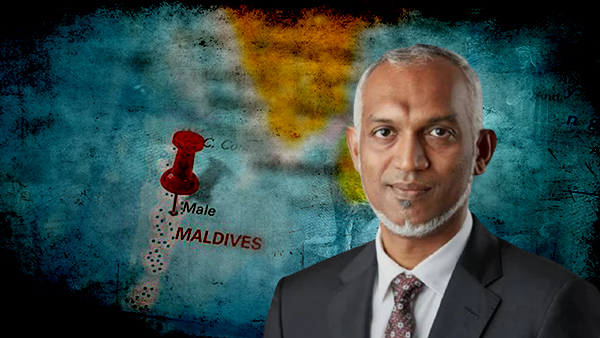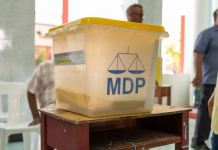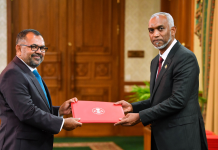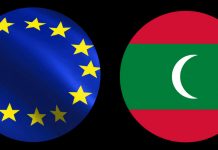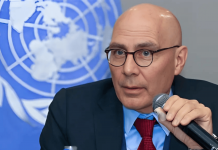Mohamed Muizzu scored over 54% of the votes in the presidential runoff in the Maldives. Muizzu’s People’s National Congress, and its coalition partner, the Progressive Party of Maldives, ran the election on an “India Out” platform.Muizzu had promised to remove Indian troops from the Maldives and balance the country’s trade relations, which he said were heavily in India’s favour. The original slogan of “India Out” a catch phrase coined by former President Yameen, subsequently focused its attention on the “India Military Out” campaign. A political slogan used by politicians for just sloganeering is fine, but when one digs deeper the need to understand the India-Maldives relationship becomes necessary. The bottom-line is that India seeks ties with the Maldives for mutual benefit and the so-called presence of the military is only limited to the supply of a few patrol boats and Dornier aircraft. The presence of 75 personnel in the island nation is not a big thing, unless one sees it from the perspective of a nation who has a vested interest in helping Yameen in launching the “India Out” campaign. The nation in question is China. India and China have totally different goals in the Maldives. India’s goals are for mutual benefit.
To understand the context in which the India military out campaign is situated, the details of the so-called ‘presence’ are spelled out here. In November 2021, the MNDF said that 75 Indian military troops were stationed in the Maldives to assist the operations of the Dornier aircraft and two helicopters gifted by the Indian government. This presence, although minuscule, has been projected as a ‘threat’ to Maldives’ security by some politicians. Earlier in February 2021, India had extended a US$ 50 million line of credit to the Maldives for defence projects. It also signed a deal with Male to construct and maintain a naval facility. The agreement to “develop, support, and maintain” the Coast Guard harbour in Uthuru Thila Falhu was signed by India’s External Affairs Minister Dr. S. Jaishankar and Mariya Didi, the Maldives Defense Minister. At the time, Didi said that the harbour and dockyard would be “another significant milestone” in bilateral defence cooperation. Therefore, removing Indian military presence from the Maldives could be the first order of business for Maldivian President-elect Mohamed Muizzu.
In his victory speech, Muizzu stated that the people of the Maldives have decided they do not want Indian troops in the country. This is in sharp contrast to incumbent President Ibrahim Mohamed Solih, who had committed the Maldives to an “India First” policy and called New Delhi as the first responder in times of crises. India’s approach to the Maldives was recently articulated by Arindam Bagchi, spokesperson for India’s Foreign Ministry, who said the countries need to work closely on regional security challenges. He added that “The focus of (India’s) partnership with the Maldives has always been on capacity building and working together to address our shared challenges and priorities, including security challenges and priorities”.
Indian military presence in the atoll state includes two Dhruv Advanced Light Helicopters helicopters operating in Male, and a Dornier aircraft to the Maldives National Defence Force (MDNF) in 2020 with the condition that while it will operate under the command and control of MNDF, the running costs will be borne by India. The Dornier has since been assisting in the joint surveillance activities by India and the Maldives of the exclusive economic zone (EEZ) of the Indian Ocean atoll state. The larger view is that India provides the largest number of training opportunities for the MNDF, meeting around 70% of their defence training requirements. India has trained over 1,500 MNDF personnel over the past 10 years. Assuming that some Indian troops are eventually withdrawn as a symbolic victory for Muiz, Male will have to maintain its engagement with the New Delhi for the simple reason that this relationship is built on the premise that India’s aid and assistance to the Maldives is for the latter’s benefit, unlike in the case of China, whose sole interest is in penetrating the Maldives for its own benefit.
In this context, the World Bank’s Maldives Development Update (3 October) is noteworthy. Aptly titled “Batten Down the Hatches”, the update warns the Maldives to prepare for the impending crisis of debt servicing which is expected to peak in 2026. Primary amongst countries with a stake in the Maldives are China and India. To a lesser degree, Pakistan and Saudi Arabia also have an interest in the island nation. China’s primary goal was to get them on board the Belt and Road Initiative (BRI) and in September 2014, former President Yameen did just that. Adjacent to BRI routes used for carrying China’s energy supplies, the strategic maritime location of the Maldives benefits Beijing. China has been undertaking infrastructure projects and making significant economic investments in the Indian Ocean region as part of the BRI.
Unlike China which has provided high interest buyers credit loans to finance infrastructure projects, India has always helped the Maldives to fill the budget deficit with low interest budget support credit and currency swaps. India’s financial help to Maldives has been generous over the years and that India has been working on some important infrastructure projects. In November 2022, India handed the Maldives US$ 100 million to ease the country’s financial challenges. In the absence of India, the Maldives had, and in the future, will depend on private investors who charge high interest for credit. In a scenario of debt default, like Sri Lanka, the Maldives will have to surrender its national assets/sovereignty to China, who is the master in the art of bargaining. If the new government signs the comprehensive Free Trade Agreement with China, put on hold by the previous government, it raises the risk of surrendering the nation’s sovereignty. India’s presence and cooperation with the Maldives has always been for mutual benefit, unlike China for whom self-interest is primary. Muizzu will take the oath of office on 17 November 2023 and, it is likely that he will want to make good his promise of having the Indian military ‘out’. However, there is merit in his adopting a more cautious policy as any drastic shift in foreign policy in the Indian Ocean archipelago state could have unintended consequences. With the Maldives staring at the challenge of debt servicing, a more nuanced foreign policy approach may be more beneficial to the island nation.

